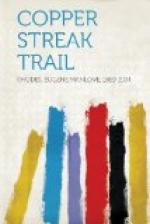By ten in the morning the heat drove them to cover for sleep and nooning in the scanty shade of a mesquite motte. Long before that, the two young gentlemen had arrived at an easier footing and the g’s were once more comfortably dropped. But poor Boland, by this time, was ill at ease in body. He was not inexperienced in hard riding of old; and in his home on the northern tip of Manhattan, where the Subway goes on stilts and the Elevated runs underground, he had allowed himself the luxury of a saddle horse and ridden no little, in a mild fashion. But he was in no way hardened to such riding as this.
Mr. Peter Johnson was gifted with prescience beyond the common run; but for this case, which would have been the first thought for most men, his foresight had failed. During the long six-hour nooning Boland suffered with intermittent cramps in his legs, wakeful while the others slept. He made no complaint; but, though he kept his trouble from words, he could not hold his face straight. When they started on at four o’clock, Pete turned aside for the little spring in Coyote Pass, instead of keeping to the more direct but rougher trail to the Fresnal, over the Baboquivari, as first planned. Boland promised to be something of a handicap; which, had he but known it, was all the better for the intents of Mr. Something Dewing.
* * * * *
For Mr. Dewing had not made good his strategic retreat to Old Mexico. When Pete Johnson left the card room Dewing disappeared, indeed, taking with him his two confederates. But they went no farther than to a modest and unassuming abode near by, known to the initiated as the House of Refuge. There Mr. Dewing did three things: first, he dispatched messengers to bring tidings of Mr. Johnson and his doings; second, he wrote to Mr. Mayer Zurich, at Cobre, and sent it by the first mail west, so that the stage should bring it to Cobre by the next night; third, he telegraphed to a trusty satellite at Silverbell, telling him to hold an automobile in readiness to carry a telegram to Mayer Zurich, should Dewing send such telegram later. Then Dewing lay down to snatch a little sleep.
The messengers returned; Mr. Johnson and his Eastern friend were foregathered with Joe Benavides, they reported; there were horses in evidence—six horses. Mr. Dewing rose and took station to watch the jail from a safe place; he saw Stanley come out with Boland. The so-called lumbermen had provided horses in the meanwhile. Unostentatiously, and at a safe distance, the three followed the cavalcade that set out from the Benavides house.
Dewing posted his lumbermen in relays—one near the entrance of Robles’ Pass; one beyond the R E Ranch, which they circled to avoid; himself following the tracks of the four friends until he was assured, beyond doubt, that they shaped their course for the landmark of Baboquivari Peak. Then he retraced his steps, riding slowly perforce, lest any great dust should betray him. In the burning heat of noon he rejoined Scotty, the first relay; he scribbled his telegram on the back of an old envelope and gave it to Scotty. That worthy spurred away to the R E Ranch; the hour for concealment was past—time was the essence of the contract. Dewing followed at a slowed gait.




